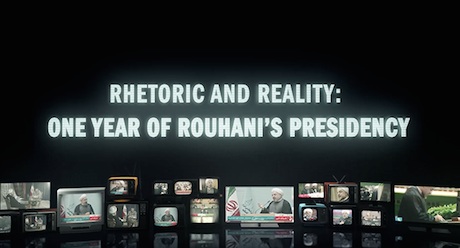 New Video Shows Gap between Rouhani’s Rhetoric and Reality on the Ground in Iran
New Video Shows Gap between Rouhani’s Rhetoric and Reality on the Ground in Iran
September 17, 2014 – Ahead of President Rouhani’s visit to New York next week, the International Campaign for Human Rights in Iran released a video today, bringing into sharp focus the disconnect between Rouhani’s rhetoric on domestic affairs and the reality on the ground.
The Campaign urges diplomats, the international media, and experts who will meet Rouhani during his visit to express their serious concerns regarding Iran’s continued abysmal human rights record.
The video, Rhetoric and Reality: One Year of Rouhani’s Presidency, contrasts Rouhani’s many pledges to usher in a new era in which the fundamental rights of Iranians would be protected, with the repression that remains firmly in place in Iran, more than one year after Rouhani assumed office.
The record of the past year speaks for itself. The number of executions continues to distinguish Iran as the highest state executioner in the world on a per capita basis. Freedom of expression, assembly, and association remain highly restricted. Iran remains the second largest prison for journalists in the world. Gender policies aiming to exclude women from public life, particularly in higher education and employment, have increased. Hundreds of political prisoners remain behind bars, many imprisoned following the disputed 2009 election. The extra-judicial house arrest of the 2009 presidential candidates, Mir Hossein Mousavi and Mehdi Karroubi, together with Mousavi’s wife, Zahra Rahnavard, is nearing its fourth year.
Many are hoping for a release of prisoners of conscience held in Iran, ahead of Rouhani’s New York trip. “This would be an absolute minimal gesture” said Hadi Ghaemi, the Campaign’s Executive Director, “as scores of political prisoners, human rights defenders, and journalists continue to languish in Iranian jails or under house arrest.”
“Rouhani states, ‘I have not forgotten anything; I am standing by all my positions.’ But the people of Iran need more than words; they need action,” continued Ghaemi.
The international community’s deep concerns over the state of human rights in Iran were reflected in the UN Secretary General’s latest report on Iran. “President Rouhani has pledged to decrease restrictions on freedom of expression and to ensure security for the press,” Ban Ki Moon’s report states. “Unfortunately, those promises have not yet led to significant improvements, and restrictions on freedom of expression continue to affect many areas of life.”
The report also noted the increase in the application of the death penalty, including in relation to political prisoners and juvenile offenders, the arbitrary detention and prosecution of journalists, human rights defenders, and women rights activists, the continued discrimination against and persecution of minority groups, and a lack of promised improvement in gender equality, media freedom, and online restrictions.
According to Iran’s constitution the president is responsible for upholding the law and making sure all other branches and institutions, even those not under the executive branch, respect the constitution. He can issue notices and warn human rights violators of their wrongdoings. So far, Rouhani has chosen not to use his full authority to challenge such violations.
“Rouhani states, ‘We want change and transformation.’ But change does not fall from the sky. He must show leadership and enact change. He may claim that as President he has limited authority, but he has not yet exhausted all his powers,” said Ghaemi.
“Rouhani has put all his eggs in the foreign policy basket, but that has also made him vulnerable. Opponents of his foreign policy are emboldened by their ability to perpetuate domestic repression and will sooner or later undermine his foreign policy too,” Ghaemi added.
Follow the Campaign on Facebook and Twitter
For the latest human rights developments in Iran visit the Campaign’s website
For interviews, contact Hadi Ghaemi at +1-917-669-5996
